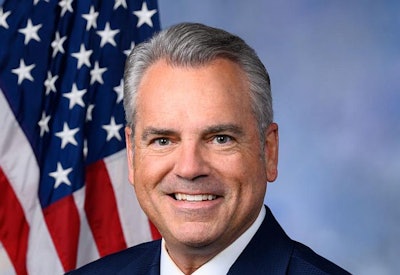
As the staff of the United States Department of Agriculture (USDA) Animal and Plant Health Inspection Service (APHIS) deals with one animal disease outbreak and the threat of others, making sure that APHIS and other USDA agencies continue to have a steady and qualified staff is very important to Rep. Mark Alford.
Alford, R-Missouri, raised those concerns on April 18 during the House Agriculture Committee’s Subcommittee on Livestock, Dairy and Poultry hearing, “A Review of USDA Animal Disease and Response Efforts.”
Alford told the subcommittee he found it imperative that APHIS was appropriately staffed to handle the current highly pathogenic avian influenza (HPAI) outbreak, as well as to be prepared for potential outbreaks of diseases like African swine fever (ASR) or foot-and-mouth disease (FMD) that haven’t reached the country yet, but could. Alford stated that it was his understanding that 13% of the total USDA workforce is presently eligible for retirement, and another 13% of the “top notch staff” will be eligible within the next four years.
“That’s a big number,” said Alford. “What are we doing to make sure that we have the workers in place to create safety?”
USDA Marketing and Regulatory Programs Under Secretary Jenny Moffitt said the agency is making sure it has “a workforce that is ready when we do have retirements,” and that it is “constantly flowing in new employees.”
Reaching young people
Moffitt said as part of a plan to keep the pipeline open, USDA has many programs available for high school students who are interested in getting involved in agriculture, becoming a veterinarian or working in other fields in agriculture. Programs for college students, including internships, are also available.
Alecia Naugle, APHIS Veterinary Services Associate Deputy Administrator, agreed that the outreach needed to start with students.
“We need to start young. We need to start with students that are in 4-H and FFA, perhaps targeted in areas where we know there are major livestock industries, to get some of those students interested in animal health jobs,” she said, reiterating internships and scholarship programs that help veterinary students who in turn can go to work for the USDA.
Alford asked what Congress could do to help. Moffitt thanked him for the question, and said she would consult with colleagues for their ideas and relay those ideas to him.
Two subcommittee members, Marc Molinero, R-New York, and Ronny Jackson, R-Texas, also discussed with Moffitt and Neagle educational institutions within their districts that could help fill the void.
Moffitt told Molinero she knew of “incredible technical colleges in New York.”
“That is an incredible opportunity to build a pipeline and let them know that working in a lab or animal health setting is an option,” she said.
Meanwhile, Jackson wanted to make sure a veterinary college in his district was on USDA’s radar.
“I’m hopeful that the USDA recognizes the potential at the Texas Tech University School of Veterinary Medicine as a pipeline to the talent they so desperately need,” Jackson said.


















